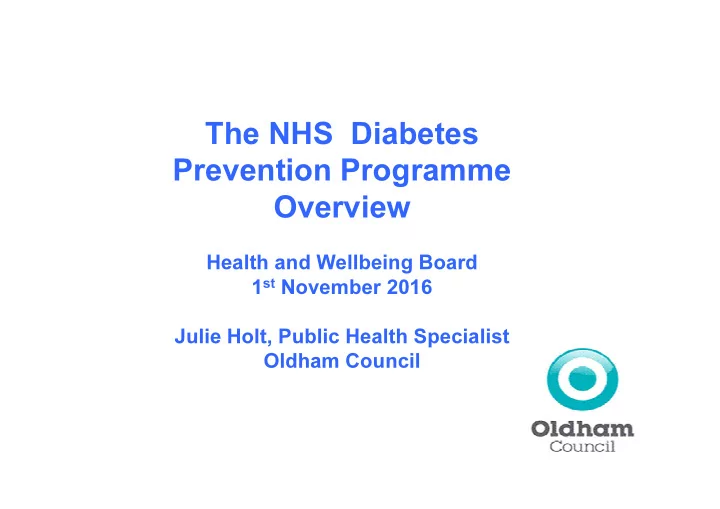

The NHS Diabetes Prevention Programme Overview Health and Wellbeing Board 1 st November 2016 Julie Holt, Public Health Specialist Oldham Council
Overview • What is the need for prevention of Type 2 diabetes mellitus? • National context • Diabetes and ‘pre-diabetes’ prevalence in Oldham • What is the NHS Diabetes Prevention Programme, ‘Healthier You’ ? • What are the challenges for the programme? • What else is needed? • What is the role of the Health & Wellbeing Board?
1. National Context
2. Diabetes in Oldham • Approx. 68% of adults in Oldham are overweight or obese • There are 13,888 patients aged 17 years+ in Oldham diagnosed with diabetes and on GP diabetes registers (7.1% population) • Approximately 90% have type 2 diabetes • 3,000 more people are estimated to have diabetes but are not aware of it • An estimated 20,900 people have ‘pre-diabetes’ - that is they have a blood sugar level and other factors which put them at risk of developing diabetes • 5,800 patients on GP records already identified as eligible for the NHS DPP
3. An evidence-based intervention • A long term intervention of at least 13 sessions, spread across a minimum of 9 months, for a minimum of 16 hours contact time • Underpinned by three core goals: • Weight loss • Achievement of dietary recommendations • Achievement of physical activity recommendations • Helps people to set and achieve goals and make positive changes to their lifestyles. • Sessions will be delivered predominantly ‘face-to-face’,in groups
4. Objectives of the Programme • To reduce blood glucose (blood ‘sugar’) parameters (HbA1c or Fasting Plasma Glucose (FPG)) in Service Users at 12 months and beyond; • To reduce weight of Service Users at 12 months and beyond; • Participants to achieve UK dietary recommendations related to fibre, fruit and vegetables, oily fish, saturated fat, salt and free sugars; and • Participants to achieve the England Chief Medical Officer’s (CMO) physical activity recommendations.
5. Challenges to the success of programme Actions • Communications (CCG and • Primary Care engagement Council) • Public awareness and patient • Awareness events and engagement communications (Council, CCG & GPs) • Ensuring the ‘right’ people attend • Monitoring (CCG) and programmes – equitable access, encouragement (all) from deprived communities, different ethnicities, people with learning disabilities, etc. • Monitoring (CCG) and • Attendance and completion of encouragement (all) programme • Monitoring and evaluation • Achievement of outcomes (CCG and national team) • Individual monitoring (GPs) • Maintenance of health behaviours and encouragement (all)
Contact details For more information or to discuss diabetes prevention contact: Julie Holt Public Health Specialist Email julie.holt1@oldham.gov.uk Andrea Tait Public Health Programme Manager andrea.tait@oldham.gov.uk Thank you for listening
Recommend
More recommend